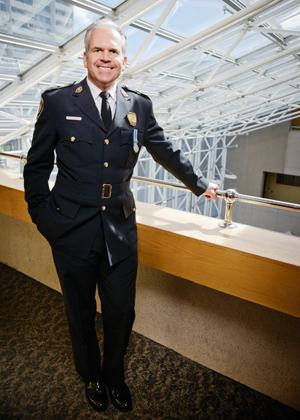As I reach the top floor of the Elgin St Ottawa Police Service (OPS) headquarters, the newly appointed chief, Charles Bordeleau, is there with a smile to greet me.
Bordeleau’s ascension to the OPS top job came as a bit of a surprise earlier this year, when his predecessor, Vern White, accepted a Senate appointment mid-contract.
White had a mixed relationship with the queer community, facing many ups and downs during his tenure. While he made history by facilitating the first Trans Day of Remembrance police flag unfurling and ceremony in Canada, in November 2010, under his leadership the service also faced plenty of negative criticism.
It was pilloried when it released the personal details and a photo of an HIV-positive man accused of not disclosing his status to his sexual partners. The OPS under White also conducted frequent sex-worker street sweeps and crackdowns on public sex. Under White’s watch an officer was charged with sexual assault in connection with the arrest of Stacy Bonds.
While Bordeleau served as White’s deputy since 2010, he acknowledges he may need to take a different approach with some of the force’s more challenging files.
Among those issues, public sex and nudity have recently been in the headlines, with the arrest last year of several gay men at a nudist area in Gatineau Park. Bordeleau says it’s a balance. “I think if we’re getting complaints about it, and it’s impacting members of the community, I think we have a duty and the community expects us to be responsive. How we respond and how we deal with it is a totally different approach. My focus is on prevention, solutions and having a discussion around the issues, as opposed to waiting and then sending the troops out to be reactive.”
I mention that this approach is a marked shift from the previous OPS leadership.
“I am not in the rumour business,” Bordeleau responds. “I am not going to go out looking for work. I already have enough to do without following a rumour about a few people in the woods.”
Bordeleau is relaxed and comfortable talking openly about sex — public, gay, whatever. It’s refreshing. He is already a recognizable face to many in the queer community as one of the most visible OPS members of the Ottawa LGBTQ police liaison committee. He’s also looking forward to Pride — “I will be there” — and continuing to support the work the Youth Services Bureau does in the queer youth community.
“I’ve always wanted to serve my community in this way,” he says.
Near his framed diplomas from the University of Ottawa’s Telfer School of Management and Royal Roads University is a bobblehead doll inscribed with the words “To serve and protect.”
Bordeleau’s personal slogan is “Everyone matters.”
“Whether you’re a victim of a crime, whether you’re a complainant, whether you have been charged with a crime, everyone in this community deserves to be treated with respect and dignity, and we need to ensure that we are responsive to the issues in our community,” he says.
It seems this finally includes sex workers, who have long argued that Ottawa police treat them unfairly.
“Since the press conference in December, when we announced the danger for sex-trade workers, we have not conducted a sweep since that time,” Bordeleau says, referring to a warning last year about a pattern of violence against Ottawa sex workers. “I know it’s a difficult relationship. To conduct sweeps is one tool in our kit.”
Bordeleau says he is focusing on other options and has assigned two new officers to build a stronger relationship with the city’s sex workers. “We are dedicated to build that relationship and to build trust,” he says.
This is a sharp turn for the OPS, which under White often refused even to talk about the issue of sex workers, many of whom also belong to the queer community.
Bordeleau says he believes leadership at the top will help guide the service to become more engaged with the queer community.
Yet while he signals change in OPS dealings with sex workers and the queer community, Bordeleau recently maintained the force’s hard-line, anti-science position on harm reduction, rejecting a recent study that recommended that two supervised injection sites be set up in Ottawa.
“As long as the criminal element is there, we will have issues around the current form of safe injection sites,” Bordeleau told reporters, rebuffing the opinions of experts at St Michael’s Hospital and the University of Toronto. He has instead advocated for providing more rehabilitation for addicts.
Maybe after some time in the top job, Bordeleau’s position on this issue will also shift. Until then, his comments on other previously contentious issues will be welcome to many in the queer community.
“I want to ensure the community has confidence in our police service and that our members feel proud of the work that they do,” he says. “My goal is to ensure our officers understand what the organizational priorities are and what the community priorities are, and how they mesh together.”

 Why you can trust Xtra
Why you can trust Xtra


